Constitutional Rights
NLC President Released from DSS Custody, Vows to Continue Labour Struggle

By Our Correspondent
Joe Ajaero, President of the Nigeria Labour Congress (NLC), has been released from custody by the Department of State Services (DSS) after being detained on Monday morning. The NLC confirmed his release through a brief statement on its official social media handle, stating, “Comrade Joe Ajaero released from DSS detention. The struggle continues, we can’t be silenced.”
Ajaero was arrested at the Nnamdi Azikiwe International Airport in Abuja as he prepared to board a flight to the United Kingdom for an official engagement with the Trade Union Congress (TUC) in the UK. The arrest triggered immediate outcry from the NLC, with the union describing the move as an “intimidation” of Nigerian workers.
In a statement issued shortly after the arrest, the NLC spokesperson, Benson Upah, condemned the detention, calling it an “assault on Nigerian workers.” The union demanded an end to what it described as continued harassment by the state.
Ajaero’s detention sparked widespread concern across labour circles and among civil society groups, fueling speculation about the reasons for his arrest. The DSS did not immediately provide details on the cause of Ajaero’s detention.
The NLC has been at the forefront of ongoing industrial actions and negotiations with the Nigerian government over labour issues, including wage adjustments and workers’ welfare. Ajaero, a key figure in these struggles, has remained vocal on behalf of workers, challenging the government on policies that the NLC views as detrimental to the Nigerian workforce.
Despite his brief detention, Ajaero has vowed to continue the struggle, signaling that the labour movement remains undeterred. “The struggle continues,” the NLC affirmed in its statement, suggesting that tensions between the government and organised labour may escalate in the days ahead.
As of now, no official statement has been released by the DSS explaining the arrest or the conditions surrounding Ajaero’s release.
This development follows a series of confrontations between the NLC and the Nigerian government over key issues such as subsidy removal, wage reforms, and economic policies that have affected workers across the country.
Constitutional Rights
Niger Declares Hausa as National and Official Language in New Constitution

By Our Correspondent
In a historic move aimed at strengthening national identity and promoting indigenous culture, the transitional government of the Republic of Niger has adopted Hausa as both the national and official language of the country.
The decision, which was announced on Sunday, is part of the new draft constitution introduced under the leadership of President Abdulrahman Tchiani. The draft document outlines Hausa as the primary language for official communication, legislation, education, and public administration.
This marks a significant shift in language policy in the francophone West African nation, where French has long been the official language since independence from colonial rule. Hausa, widely spoken across Niger and in neighboring countries, now gains formal recognition as the unifying language of government and people.
According to government officials, the move is aimed at fostering inclusion, improving public engagement in governance, and preserving the country’s cultural heritage. “This decision reflects the reality on the ground,” a senior official in the constitutional committee stated. “Hausa is spoken by the majority of our citizens. Making it our official language is a step towards true national representation.”
The announcement has been met with mixed reactions. While many citizens and cultural advocates have praised the move, citing it as a long-overdue recognition of indigenous identity, others have raised concerns about the implications for education and diplomacy, especially with Niger’s long-standing ties to French-speaking institutions and countries.
The new constitution is expected to undergo further public review before being officially ratified.
Constitutional Rights
Bukarti: Shadow Government Concept Not Unconstitutional in Nigeria
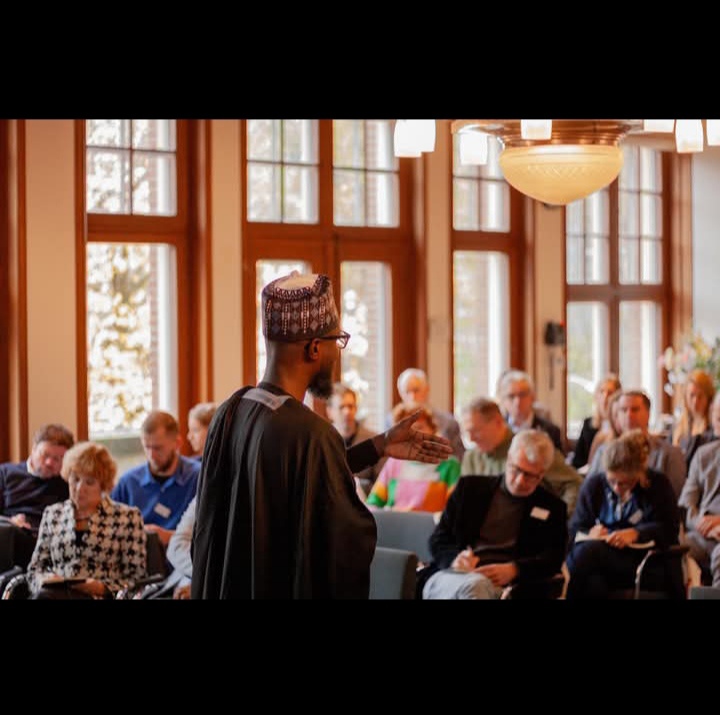
By Our Correspondent
Renowned human rights activist and governance expert Bulama Bukarti has clarified that the concept of a shadow government does not violate the Nigerian Constitution or any existing laws.
Speaking in an interview with BBC Hausa, Bukarti, a Senior Fellow at the Extremism Policy Unit of the Tony Blair Institute for Global Change, described the system as a lawful mechanism for influencing governance.
“The constitution does not need to explicitly provide for a shadow government system for citizens to implement it,” Bukarti stated. He explained that the concept allows citizens to monitor and influence government policies to address governance challenges. “In this context, it does not conflict with the law,” he added.
However, Bukarti cautioned against misusing the idea. “What the law prohibits is an individual falsely claiming to be the governor without having won an election. The only scenario where such a system would be prohibited is under a dictatorship,” he noted.
His remarks follow heightened political activity in Kano State, where the Patriotic Volunteers, a group within the opposition All Progressives Congress (APC), announced plans to form a shadow government.
The group’s National President and former Secretary to the State Government (SSG), Alhaji Usman Alhaji, stated at a press conference in Kano that the initiative aims to hold Governor Abba Kabir Yusuf’s administration accountable.
“Our plan is to establish a shadow government apparatus that will effectively monitor the activities of the current Kano State government. The people of Kano deserve to be informed about the alleged failures of Abba Yusuf’s administration,” Alhaji said.
The proposal has drawn criticism from the Kano State government. In a statement, the Kano State Commissioner for Information, Ibrahim Abdullahi Wayya, argued that forming a shadow government outside the law is unconstitutional.
“Democracy does not permit anyone to lose their sense of judgment simply because they have lost relevance within their party’s political structure,” Wayya stated. He emphasized that Nigeria’s presidential system does not accommodate shadow governments as practiced in parliamentary systems like the United Kingdom.
“Forming a government within a government is entirely illegal and unconstitutional. While opposition parties in a parliamentary system may appoint shadow ministers to scrutinize the ruling government, Nigeria operates a presidential system that neither recognizes nor supports such a structure,” Wayya said.
Award
CNG Criticizes Proposed Tax Reform Bill, Calls for Comprehensive Review and Greater Transparency
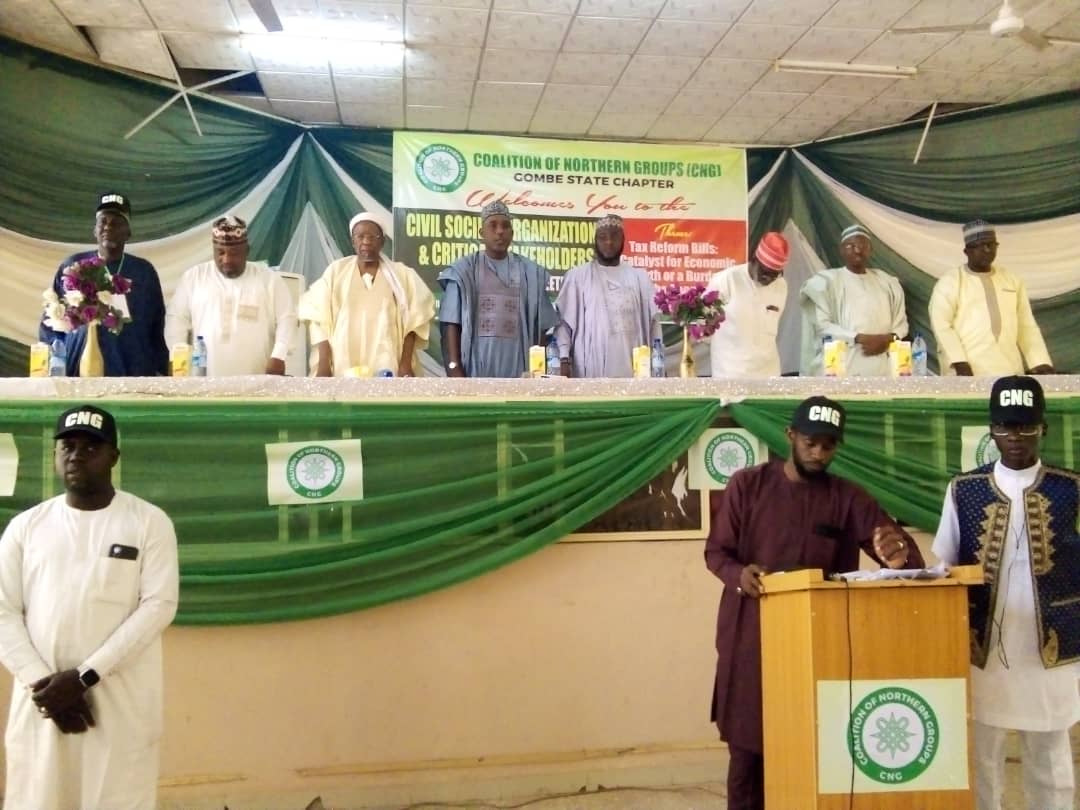
The Coalition of Northern Groups (CNG) has voiced strong opposition to the controversial tax reform bill recently presented by President Bola Ahmed Tinubu to the National Assembly. The organization raised concerns over several provisions in the bill, calling for a thorough review before it is passed into law.
At a town hall meeting held on January 6, 2025, at Gombe State University, Comrade Jamilu Charanchi, the National Coordinator of CNG, outlined the contentious aspects of the bill and urged the Federal Government to provide Nigerians with a clear report on the outcomes of the fuel subsidy removal, as well as a transparent account of how the savings have been utilized.
Speaking at the event, Professor Abubakar Sadiq from the Federal University of Kashere echoed similar concerns, criticizing the government for pushing forward with the bill despite significant opposition from across the country. He stressed that the proposed tax reforms could place undue pressure on Nigerians already facing economic challenges.
The meeting, themed “Tax Reform: A Catalyst for Economic Growth or a Burden on Nigerians,” drew significant participation from civil society organizations and regional representatives. An overwhelming 99% of attendees expressed their opposition to the bill, highlighting widespread dissatisfaction among the public.
Comrade Muhammad Usman Deba, the CNG’s Coordinator for Gombe State, further emphasized the potential negative impact of the tax reform on Northern states. Deba noted that while the bill aims to boost national revenue, it risks disproportionately benefiting Southern states, particularly those with higher economic activities, such as Lagos. This imbalance could reduce the revenue shares allocated to Northern states, exacerbating existing economic disparities and potentially leading to migration and social unrest.
Deba also criticized the lack of data-driven policymaking and transparency, urging the government to provide solid evidence supporting the proposed changes. He called for a more inclusive approach, with a transparent and equitable revenue-sharing formula that involves consultations with stakeholders from all regions.
The CNG concluded by urging the Nigerian Senate to halt deliberations on the bill and engage in more consultations to ensure the reform promotes national unity and balanced development. They emphasized the need for a fair tax system that ensures no region is marginalized in the pursuit of economic growth.
-

 Leadership12 months ago
Leadership12 months agoBreaking: African Union Appoints Pantami as Co-Chair of the 4th Industrial Revolution Policy Council
-

 Politics1 year ago
Politics1 year agoFormer Gombe State APC Promoters Forum Chairman Attacked Following Political Commentary
-
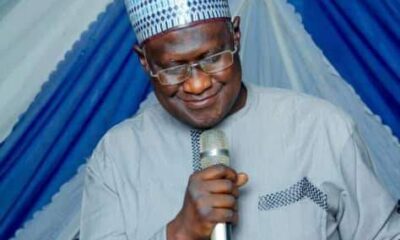
 Appointment10 months ago
Appointment10 months agoGombe State Indigene, Appointed New Vice Chancellor (ATBU)
-
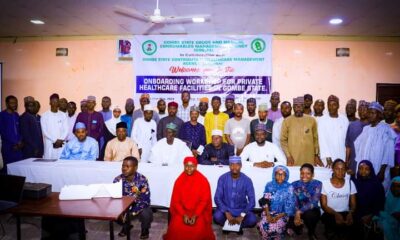
 Health1 year ago
Health1 year agoGombe State Organizes Onboarding Workshop for Private Healthcare Facilities
-
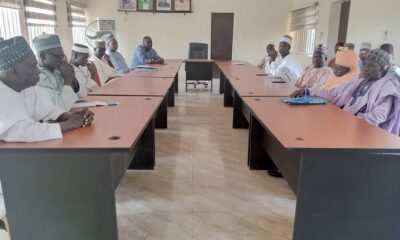
 Water1 year ago
Water1 year agoGombe Government Mobilizes Stakeholders to Combat Illegal Water Connections
-
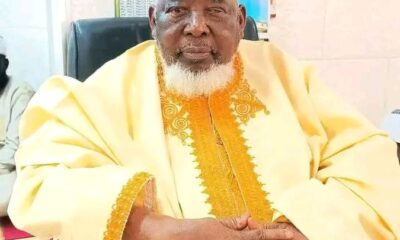
 Death5 months ago
Death5 months agoProminent Nigerian Islamic Scholar, Sheikh Sa’idu Hassan Jingir, Passes Away
-
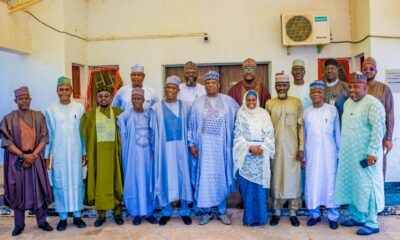
 Politics1 year ago
Politics1 year agoGombe State Inaugurates Human Capital Development Council
-
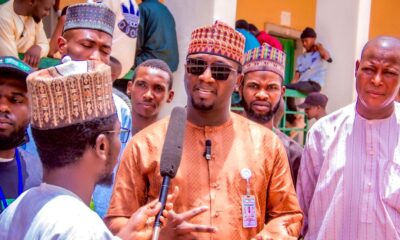
 Politics1 year ago
Politics1 year agoGombe State Launches Presidential Palliative Program (PPP) to Aid Small Businesses
